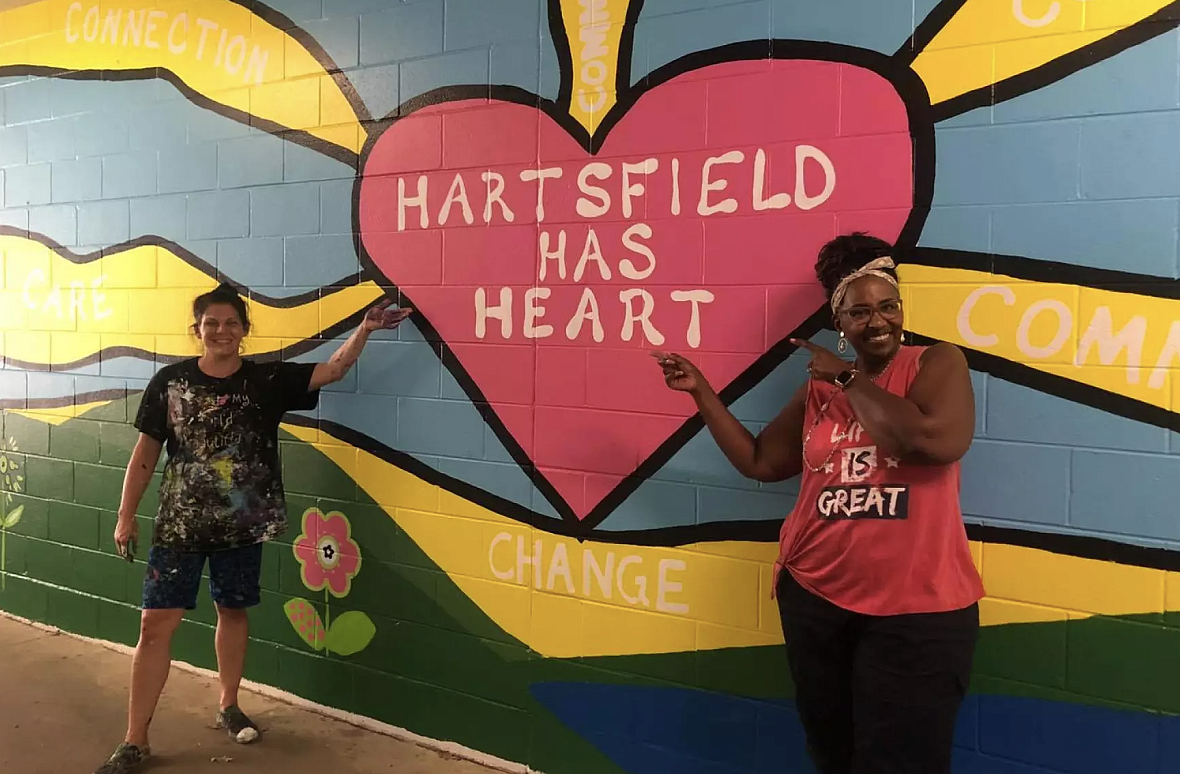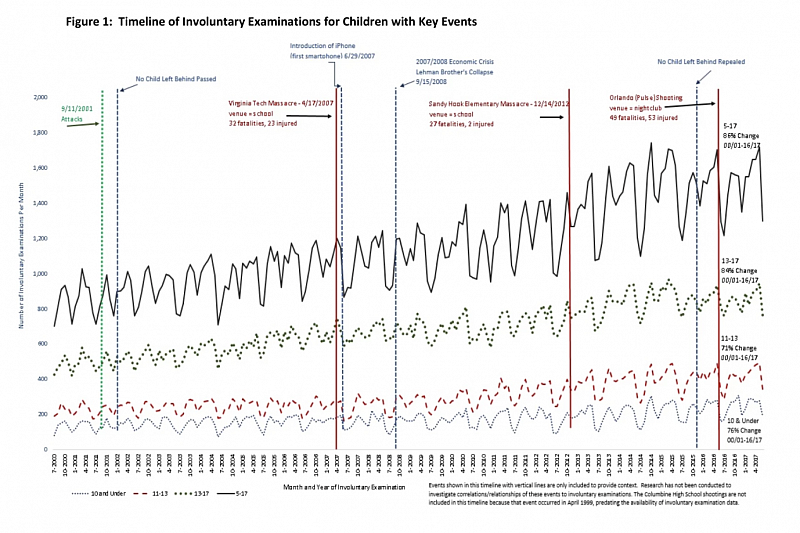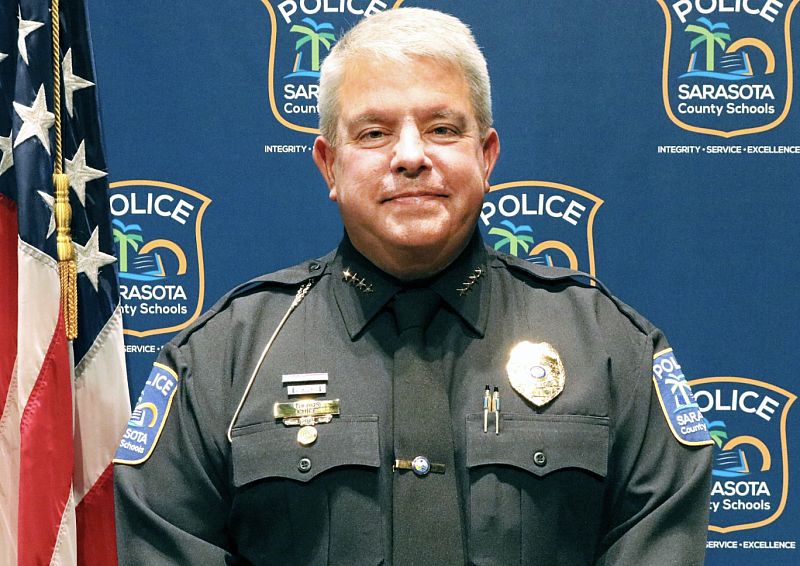Among the best predictors of whether a child will be taken for an involuntary psychiatric exam under the Baker Act in Florida, is a history of trauma. But school psychologists, who know most about how to treat early childhood trauma, are in short supply. So, often times, resource officers are called to intervene when children are struggling. Mental health experts say it doesn't have to be that way and some schools are changing their approach to student discipline. In the fourth part of this series on the Baker Act, we explore what one school in Tallahassee is doing to address early childhood trauma and avoid having children committed.
A Trauma-Informed Disciplinary Approach
Rhonda Blackwell-Flanagan is sitting in the courtyard of Hartsfield Elementary School in Tallahassee. She’s wearing a mask as she explains her school's different approach to discipline. Instead of words like "no," "stop," "don’t" and "quit," kids hear something else.
“Within that, we give you two good choices: You may do this, or you may do that," Blackwell-Flanagan said. "But you cannot do this … and the choice is always in the direction of where you want them to go, what you want them to do."
It’s a concept called conscious discipline. The goal is to give children, who often have no say, a voice in their own affairs. Hartsfield Elementary is a Title 1 school — the designation qualifies it for additional funding. And the school has used that money to change its approach to student discipline. Blackwell-Flanagan knows what it’s like for a student to be in crisis.
“You see this cute girl … and you could never see her standing on this desk growling at you," she said, recalling a time when she had to refer a child for an involuntary psychiatric exam under the Baker Act.
Conscious Discipline is about forming relationships with and bonding with children to build trust, and focusing on de-escalation and problem solving.
The methods may sound new age, but Blackwell-Flanagan said they work.
“I definitely know the number of out-of-school suspensions has decreased," she says. "I cannot recall the last time there was an actual, physical altercation."ethods may sound new age, but Blackwell-Flanagan said they work.
The children have responded well to the changes, she said. The biggest challenge is getting the adults to accept it.
"I’ve learned on this journey as well and I even handle teachers who still want to berate a kid in front of kids. And I handle them differently," Blackwell-Flanagan said. "I walk up to teachers [and say] ‘do you want to breathe with me?'"
Hartsfield’s conscious discipline program takes money, resources and people. And it requires the right kind of people — psychologists, who are in short supply.
According to the ACLU of Florida, the state’s ratio of school psychologists to students is low: 1/2000. That’s far below industry recommendations, which suggest one psychologist for every 500 kids. Even at Hartsfield, a place actively trying to get better, there is a shortage.
“I think, hands-down, that more social workers, psychologists are needed on campus," Blackwell-Flanagan said. "We share resources, we see our psychologist once a week. At a school like mine, we need someone here every day."
According to the state’s Baker Act Reporting Center, in the 2018-2019 fiscal year, nearly 38,000 children were sent for an involuntary psychiatric evaluation. Children are the fastest-growing segment of the population being committed under the Baker Act. The figures have increased each year and more than doubled in the past 15. About a quarter of those referrals originate in schools. It’s the biggest share outside of calls from homes.
“So many of the issues facing our families, whether its substance abuse, mental health or criminality, trauma is the underlying issue," said Mimi Graham, head of Florida State University's Center for Prevention and Early Childhood Intervention.
The Children Are Struggling
Graham sees kids struggling in ways they didn’t 30 years ago.
Stressed parents lead to stressed kids, and trauma can be passed down from generation to generation, she said.
“We see this multigenerational cycle of adversity," Graham said. "The judges will tell you they’ve had the grandmother, mother and now they have the baby in court because of maltreatment or substance abuse."
Part of Graham’s work focuses on Adverse Childhood Experiences, or ACES. Mental health experts say kids who have experienced physical, sexual and emotional abuse can carry the trauma for life. It can come from neglect, divorce, death, abandonment and imprisonment. Other triggers include mental health struggles in the family, alcoholism and drug abuse. Contact with the child welfare or juvenile justice system can also have an effect. State data proves it. According to the Baker Act Reporting Center’s November 2019 report, most children who’ve been committed have Adverse Childhood Experiences.
"And the more ACES you have, the higher likelihood of having a substance abuse issue, having mental health problems as an adult, being involved in the courts, being incarcerated," Graham said. "So we know all those things are interrelated."
The research says just one significant relationship in a child’s life can buffer them from adversity but some kids don’t even have one person who cares. It’s why Hartsfield Elementary School has gone all in on conscious discipline and forming relationships.
Graham says the Baker Act was never supposed to be used in the way it currently is, and especially not on children. But schools, she said, are struggling in trying to manage behavior.
“It’s really challenging the schools because you know, we have more school resource officers instead of mental health counselors who understand that these challenging behaviors are often a result of the trauma that’s going on,” Graham said.
The Last 'Help' A Kid Can Get
The ACLU of Florida released a report in September critical of school resource officers, arguing their presence hurts kids. Among the report’s findings: there are more police on campus than nurses and psychologists.
Tim Enos is the head of the school resource officers association. He doesn’t believe the officers are part of the problem but says there should be more psychologists on campuses because law enforcement isn’t equipped to handle everything.
“We are trained, but we’re only trained to a certain level. We aren’t mental health therapists, counselors, we aren’t school psychiatrists … so we have to depend on the other people. Why am I involved as an SRO? ... I’d rather not have that responsibility, but we may be the only help that student gets.”
He notes police and sheriffs deputies wouldn't be at schools if there were no problems.
Law enforcement officers may get hours of training on crisis intervention and mental health compared to the years of training that some doctors, mental health counselors, psychologists and psychiatrists get. But the state gives law enforcement far more leeway in initiating Baker Acts. As a result, they’re responsible for initiating half of all referrals for involuntary psychiatric exams, and a majority of those for kids under 18. In areas of the state where there are few mental health resources, law enforcement is the only option.
In recent years, the state has pumped more money into school mental health programs, but it’s not enough. There’s a shortage of those professionals, and they’re expensive. Yet, advocates say, money won’t solve everything. For real change, they say, an overhaul of the Baker Act law is needed, and that's something lawmakers have not yet been willing to do.
Up Next: Solutions, alternatives to the Baker Act, and why they've been so hard to pass through the legislature.
This article was conceived and produced as a project between WFSU News and Health News Florida for the Fund for Journalism on Child Well-Being, a program of the USC Annenberg Center for Health Journalism’s 2020 National Fellowship.
[This story was originally published by WFSU Public Media.]





